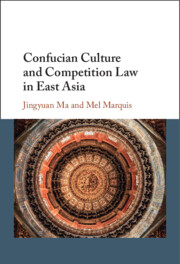‘This is an exemplary piece of social research that illuminates an important feature of international competition law and business arbitration. As well, it stands a model for all those who want to undertake comparative research on law and legal culture. It should have a wide readership far beyond those interested in Asian-pacific business law and practices.’
Malcolm M. Feeley - Claire Sanders Clements Dean's Professor of Law, Emeritus; Jurisprudence and Social Policy Program, School of Law, UC Berkeley
‘This book deeply describes the influence of Confucian culture on competition law in East Asia. Confucianism certainly influences politics, economy, society and law in China, for example, competition was deemed as a dreadful monster of capitalism in China even in the 1980s. However, even China’s competition law will be imprinted with traditional culture inevitably, but its development depends almost solely on the breadth and depth of China's economic system reform.’
Xiaoye Wang - Distinguished Professor, Shenzhen University; Professor of Law, Chinese Academy of Social Sciences
‘This book is an outstanding work and a tour de force for everyone interested in competition policy and in business law and culture as well. When, in the wake of globalisation and of worldwide spill over of competition policy spurred by the International Competition Network, competition rules have expanded its role in East Asia, especially in China. It is fundamental to understand, as the authors rightly argue, that culture contributes to the shaping of its institutions. Reading this book is a major first step for understanding that reality and its far-reaching consequences.’
Luís Silva Morais - Jean Monnet Professor of Law, University of Lisbon
‘This rousing monograph deals with Confucius and antitrust law; with differences and similarities between Western and Eastern regimes of competition policy, antitrust law and legal application and enforcement; with different legal and organizational cultures and finally - and this is where it gets really exciting - with the different legitimacy of legal disputes in East and West, because if a deficit in legal disputes can be detected in Far Eastern countries, such a finding cries out for explanation.’
Jacob Kornbeck
Source: ÖZK - Austrian Competition Journal



